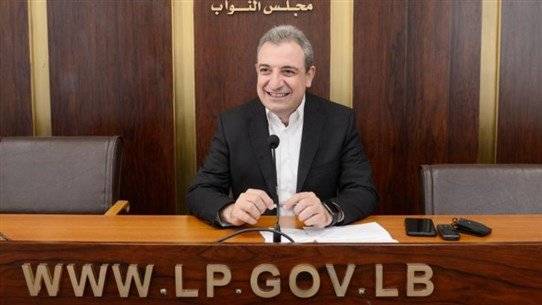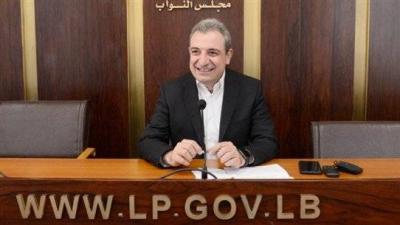Member of the "Democratic Gathering" bloc, MP Wael Abu Faour, held a press conference in the House of Representatives addressing the issue of the Lebanese University, emphasizing that "the fate of the university is at stake today, as is the fate of around 80,000 Lebanese students studying in various branches and specializations." He stated, "This university was historically established through the struggles of the changing forces in the country, when Kamal Jumblatt fought for the Lebanese University alongside a broad spectrum of the Lebanese left. However, it seems that the state's view of the Lebanese University has not changed since then; since its inception, it has been marginalized and fought against by the state, and this continues to be the case."
He continued, "It is a university that is almost ostracized due to the procedures that should have been implemented but have been neglected." Abu Faour asserted that "there is a need for internal reform at the Lebanese University and a shift towards prioritizing academic and national considerations over any sectarian or confessional interests, noting that some state officials still deal with the university based on the distribution of shares and deans among themselves, when the matter should be elevated beyond that."
Abu Faour reminded, "We are today on the brink of the new academic year, and the university presidency has not settled the debate on whether there will be an academic year or not. In previous years, many university students, unable to continue their studies due to the experience of remote learning, resorted to private universities regardless of the financial costs, which distorted the image of the Lebanese University in the minds of the students. This issue has also extended to university professors, as many of them have emigrated to European countries, only to work in secondary schools and institutes due to financial hardships."
In this context, he highlighted that "the university presidency needs 32 million dollars for the upcoming academic year, but this amount has not been secured, and there is no clear reason for that." Abu Faour asked, "How can we secure funding for other sectors while neglecting the Lebanese University? And how is it that sectors receive fraudulent support, with their funds being looted and stolen, while the university, which needs this support the most, is overlooked? We are aware that what harms it the most is the destruction of students' perspectives towards it, especially since all its students cannot afford the costs of private universities, which means we are talking about the future of Lebanon as a whole."
He added, "So far, despite the efforts of the Minister of Education and Higher Education, Abbas Halabi, in this regard, his demands have not been heard. The caretaker Prime Minister, Najib Mikati, understood this during my conversation with him and is convinced of the university's importance and the need to save the academic year, but this requires initiatives to take practical measures." He pointed out that "the Minister of Education, during his visit to Qatar, raised only the issue of the Lebanese University, and he received promises from international organizations, but so far these attempts have not led to any tangible results."
Abu Faour stressed that "all the university's entitlements are stuck in state administrations, prior to the 32 million, with no clear reason. There are 104 billion Lebanese Lira, as half salary and transportation allowance from January to June 2022, stuck in government ministries, most of which are in the Ministry of Finance, and they must be released." He continued, "In addition, there are 128 billion Lebanese Lira for extra salaries from June to December 2022 in a state of uncertainty, with no reason for the delay in their disbursement, and professors are unaware of them."
He added, "50 billion Lebanese Lira as an incentive for each attendance day for July and August, and also 120 billion for the multiplied hourly wage of contracted professors, with nobody knowing their status. There is also 77 billion for revolving funds from 2020 and 2021, and their settlements are in the Ministry of Finance, but most of them are reconciliation contracts, meaning judicial decisions and settlements."
He also mentioned that "40 million dollars are with the MEG company, including 18 million dollars with Middle East Airlines for PCR tests at that time, and 22 million dollars under companies affiliated with MEG." Abu Faour demanded that the mentioned companies pay the Lebanese University’s dues in foreign currency (fresh dollars), not according to the offers received by the university for payment through bank checks in Lebanese Lira, noting that "all these companies profit in fresh dollars, so why pay the amounts due to the national university in Lebanese Lira?" He said, "We respect these companies and their management and appreciate their success stories, but the Lebanese University also needs the funds."
Abu Faour concluded, "This matter should not be taken lightly, and as long as we want a normal academic year, we must take measures to pay these amounts to the Lebanese University, especially since there is uncertainty from the university presidency about what may happen in the upcoming academic year." He questioned "the extent of the academic, cultural, and educational catastrophe if 80,000 students were to stop their studies?" He affirmed that "the Democratic Gathering will continue its communications with all concerned ministers, but this matter requires swift action and cannot be compromised at all."




